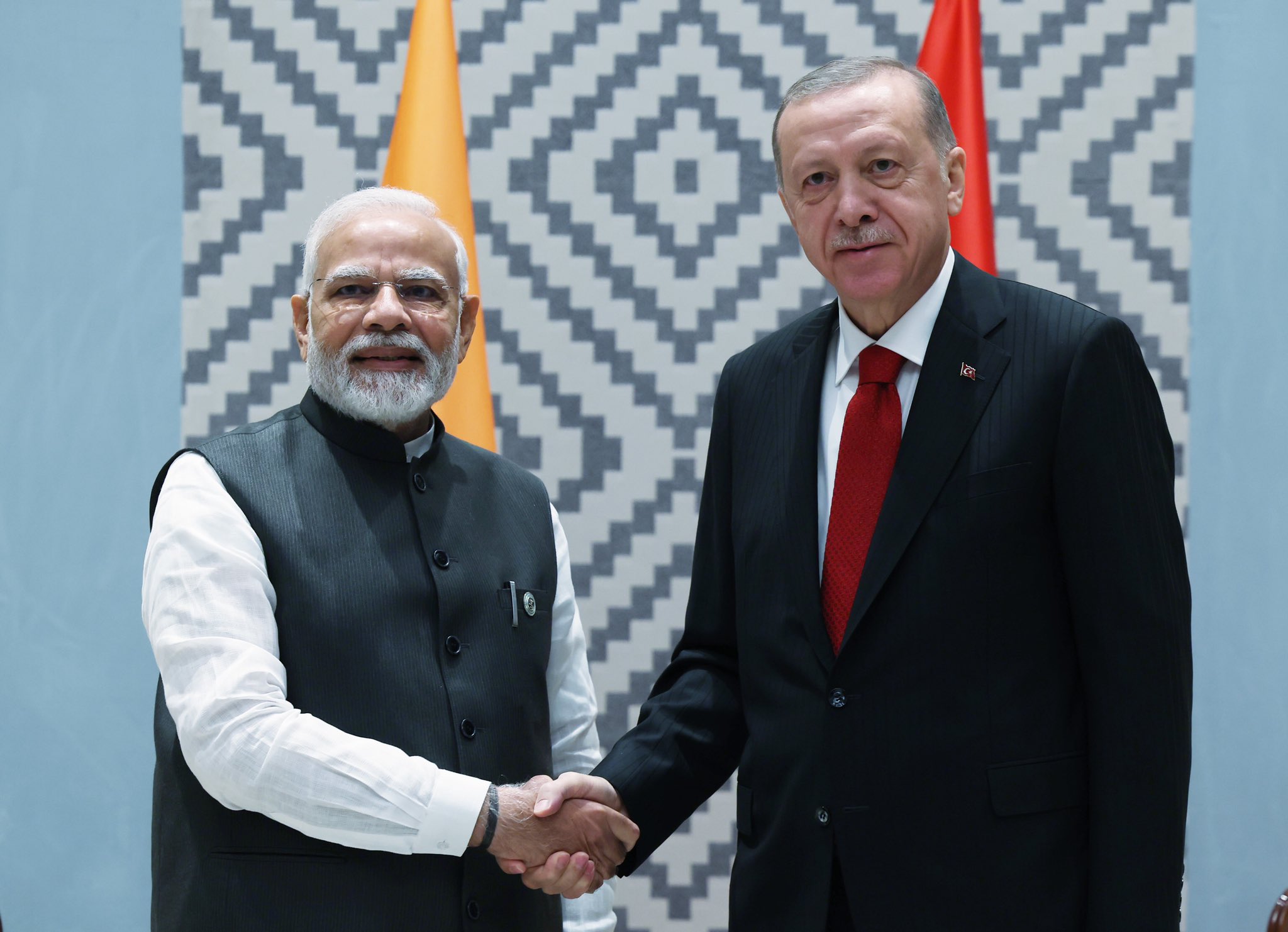Turkey—India ties have hit a nadir. The Turkish government has imposed a comprehensive ban on exporting military equipment to India, one of the biggest arms importers in the world. The move comes months after New Delhi canceled the contract with a Turkish firm involved in a shipbuilding project in an Indian shipyard.
US Pushes “F-22, F-35 Fusion” To Indian Air Force Under Make In India; Lockheed Boss Meets PM Modi
The Turkish government has not made big announcements about it; rather, the decision was taken at a closed-door session in the Turkish Parliament.
According to the minutes of the debate at the Foreign Affairs Committee on July 10, 2024, Mustafa Murat Şeker, deputy chairman of the Presidency of the Defense Industry (SSB), Turkey’s top arms procurement agency, inadvertently disclosed the government’s secret policy regarding India.
The move should not come as a surprise as the two countries have found themselves in opposite corners when it comes to geostrategic issues. With increasing hobnobbing between Turkey and Pakistan, India has been taking a stand against Turkey on international issues. After taking a stand in the Armenia-Azerbaijan conflict, New Delhi has made it clear that in the conflict in the Aegean Sea between Turkey and Greece, it is siding with the latter.
Forget J-20, China’s H-20 Stealth Bomber Threatens ‘Easy Penetration’ Of LAC; How Can IAF Respond?
In April, New Delhi canceled the contract with a Turkish firm involved in a ship-building project in India even as it hosted the Chief of the Hellenic National Defense General Staff at a fighter base.
Seker, calling his disclosure sensitive, told lawmakers that not a single sale of any military article was approved by the government when the customer was based in India. The information about the secret ban has been made public despite the risk of the fallout with India. The minutes were obtained by Nordic Monitor.
“India, for example, is one of the world’s top five arms importers, a massive market, importing close to $100 billion. However, due to our political circumstances and our friendship with Pakistan, our Ministry of Foreign Affairs does not give us positive feedback on exporting any products to India, and consequently, we do not grant any permits to our companies in this regard,” he said.
The sale of Turkish defense articles abroad requires prior approval from the Turkish military, the SSB, and the Foreign Ministry. The ban has put India on a blacklist of countries to which Ankara will not supply military and defense products.
F-16s “Sitting Ducks” For Russian MiG-31 Fighters? Putin Warns Of Consequences Over Fighting Falcons
The ties between India and Turkey have been going downhill as Turkey refused to decouple itself from Pakistan on the issue of Kashmir. Since the abrogation of Article 370 in 2019 in Jammu and Kashmir, Turkey has not let go of any opportunity to raise the issue on an international forum.
Turkish President Recep Tayyip Erdogan has supported Pakistan in all diplomatic forums, such as the UN General Assembly, the UN Human Rights Council, and the Financial Action Task Force.
Erdogan, in his speech at the 74th session of the United Nations General Assembly, declared, “Kashmir is still besieged, and eight million people are stuck in Kashmir.” On its sidelines, Erdogan elaborated. The “world should know the sufferings of Kashmir,” he said, drawing parallels between Kashmir and Palestine by calling Kashmir an open-air prison.
The Indian government responded by cozying up with the leaders of Armenia, Cyprus, and Greece—all three countries with which Turkey is embroiled in disputes. In 2019, Indian Prime Minister Narendra Modi was slated to visit Turkey and Saudi Arabia. But the visit to Turkey was canceled, and the Prime Minister visited only Saudi Arabia, sending a message to Ankara about India’s diplomatic preferences.
In April, India’s Hindustan Shipyard Limited (HSL) terminated all agreements with Turkish firms to construct the fleet of five support ships for the Indian Navy and decided to go ahead with the construction on its own.
The project, estimated to cost between US $1.5 billion and $2 billion, initially envisaged the transfer of technology from Anadolu Shipyard, part of the Turkish TAIS consortium, with which HSL signed an agreement for technical collaboration in 2020.

Turkey’s Growing Ties With Pakistan
While Turkey has banned exports to India, news has come that Ankara is in talks with Islamabad to make it an official partner in the development of the 5th-generation fighter jet KAAN.
While it is unclear when Pakistan will be able to join the Turkish combat aircraft program, in 2023, Turkey has indicated that it plans to begin negotiations with Pakistan as soon as possible.
“Pretty soon, within this month, we will be discussing with our Pakistani counterparts to officially include Pakistan in our Kaan national fighter jet program,” Turkish deputy defense minister Celal Sami Tufekci said in Pakistan on August 2, 2023.
The announcement came just days after Azerbaijan joined the fighter jet project. Turkish Aerospace, which is leading the development of the Kaan, has a close relationship with Pakistan Aeronautical Complex (PAC) Kamra, the state-owned military aircraft company, and maintenance, repair, and overhaul house.
Turkey has sided with Azerbaijan and Pakistan in the conflict with Armenia. New Delhi has responded by supplying arms to Armenia. At the beginning of this year, as India’s ties with the Maldives went South, a move purported to be orchestrated by China, Turkey supplied Bayraktar TB2 drones for maritime surveillance.
The UAVs were delivered as the Maldives asked Indian defense personnel to leave the island country, forgoing decades-old military and civil ties with India.
- Ritu Sharma has been a journalist for over a decade, writing on defense, foreign affairs, and nuclear technology.
- The author can be reached at ritu.sharma (at) mail.com
- Follow EurAsian Times on Google News




